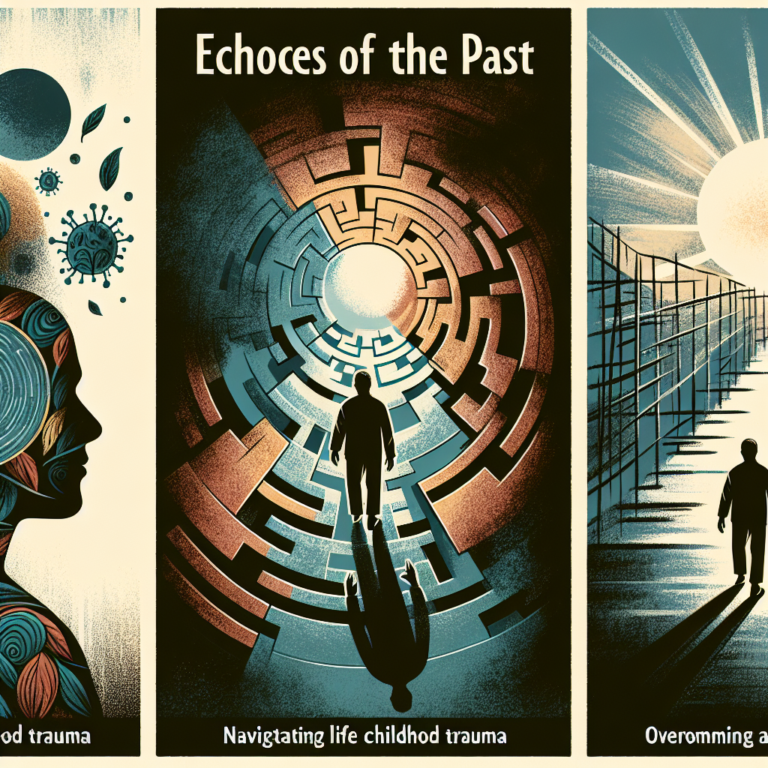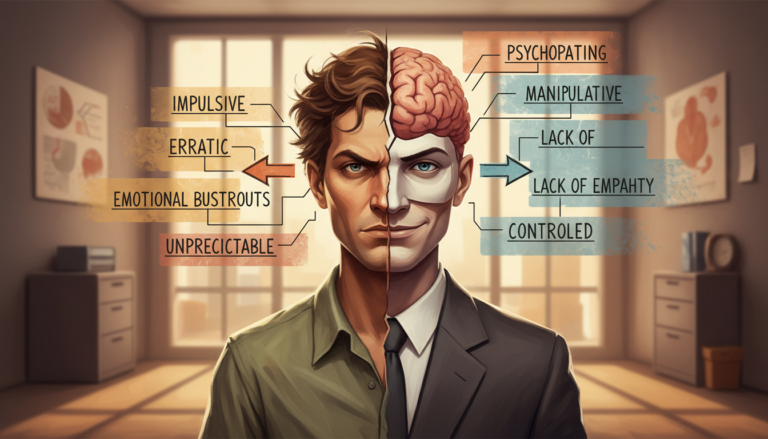
Navigating the Waves of Grief: Understanding the Five Stages and How to Cope Effectively
Grief is a complex and deeply personal experience, and when we navigate the waves of grief, we often find ourselves riding an emotional tide that can be difficult to understand and even harder to manage. Whether it’s the loss of a loved one, a significant life change, or even the end of a relationship, the process of grieving can feel overwhelming. But in recognizing that grief is universal, we can seek comfort in shared experiences and insights. This article, Navigating the Waves of Grief: Understanding the Five Stages and How to Cope, aims to provide a thorough exploration of the stages of grief, along with practical coping strategies, so you’re not alone in this journey.
Introduction: The Journey of Grief
Grief is often described as a journey, a series of waves that ebb and flow. Many people feel isolated during their grieving process, believing they are the only ones experiencing such profound sorrow. The truth is that grief is a universal experience, transcending culture, age, and circumstances. Understanding how to navigate the waves of grief can help you cope more effectively, allowing you to honor your feelings while also moving forward in life.
In her groundbreaking work, Elizabeth Kübler-Ross introduced the Five Stages of Grief—denial, anger, bargaining, depression, and acceptance. Engaging with these stages can provide a framework for understanding what you (or someone you love) might be experiencing. Let’s explore these stages in more detail, incorporating real-world examples that illustrate the intricacies of each phase and highlight effective coping mechanisms.
The Five Stages of Grief
Stage 1: Denial
Denial is often the first response to loss. In this stage, individuals may struggle to process the reality of their loss. It’s a defense mechanism, a temporary buffer against the overwhelming emotions that follow a significant loss.
Case Study: Sarah’s Story
Sarah lost her father unexpectedly. For weeks, she found herself in a state of disbelief, unable to accept the fact that he was gone. She often replayed the moments leading up to his passing, searching for any indication that it was coming. She kept his phone number saved in her contacts, scrolling through it even though she knew he would never answer.
Analysis: Sarah’s experience illustrates that denial can serve as a protective buffer, helping individuals manage their initial shock. It is perfectly normal to struggle with the reality of loss; this phase lays the groundwork for deeper emotions to come.
Coping Mechanisms for Denial
- Acknowledge Your Feelings: It’s important to recognize that denial is a natural part of the grieving process. Avoiding your feelings can prolong denial. Writing in a journal can help clarify your emotions.
- Seek Support: Share your feelings with trusted friends or family members. Talking about your loved one can also affirm their life and legacy.
Stage 2: Anger
As denial fades, it’s often replaced by anger. This anger can be directed toward others, oneself, or even the deceased. Feelings of frustration and helplessness often accompany this stage.
Case Study: Michael’s Experience
After the death of his partner, Michael felt a surge of anger. He was angry with his partner for leaving him, angry with himself for not being able to prevent the situation, and even angry with the world. This anger manifested in confrontations with friends and family, as he struggled to understand why this happened to him.
Analysis: Michael’s journey demonstrates that anger is a natural response to grief. While seemingly destructive, it’s often a sign of the intense emotional turmoil beneath the surface.
Coping Mechanisms for Anger
- Exercise: Physical activity can be a healthy outlet for anger. Whether it’s running, kickboxing, or yoga, engaging in strenuous activity helps release pent-up tension.
- Creative Expression: Art, writing, or music can serve as powerful outlets for channeling anger into something productive.
Stage 3: Bargaining
Bargaining is the stage where individuals may dwell on what could have been done differently. This mental negotiation can manifest as “If only” thoughts, creating feelings of guilt that can be hard to shake.
Case Study: Emma’s Reflection
Emma lost her mother to illness after a prolonged battle. She often found herself thinking, “If only I had recognized the symptoms earlier” or “If only I had insisted on a different treatment.” Her mind raced with countless scenarios of how she could have changed the outcome.
Analysis: Emma’s experience underscores how bargaining can lead to deep feelings of guilt and frustration. Recognizing that bargaining is part of the process can help individuals move past these thoughts.
Coping Mechanisms for Bargaining
- Focus on the Present: Mindfulness practices can help individuals detach from “what-ifs” and embrace their current experiences. Meditation can be particularly beneficial.
- Forgiveness: Learning to forgive oneself is crucial. It’s important to recognize that no one can predict the future or control every circumstance.
Stage 4: Depression
During the depression stage, the reality of the loss truly sets in. Individuals often feel overwhelmed by sadness and despair, which can lead to withdrawal from activities and loved ones.
Case Study: David’s Downward Spiral
Following the loss of his spouse, David felt a numbness that gradually transformed into despair. He isolated himself from friends, lost interest in hobbies that once brought him joy, and felt utterly unmotivated in both his personal and professional life.
Analysis: David’s struggle reflects the depth of sorrow that can accompany loss. Recognizing these feelings as a natural part of the grieving process is vital for individuals experiencing similar emotions.
Coping Mechanisms for Depression
- Social Connections: Even during the hardest days, reaching out to loved ones or support groups can prevent isolation. Sharing grief with others can be incredibly healing.
- Professional Help: Therapy, whether through cognitive-behavioral techniques or support groups, can provide valuable tools for navigating this challenging time.
Stage 5: Acceptance
Acceptance does not mean that the loss is okay or forgotten. Instead, it represents a stage where individuals have found a way to live with the loss, recognizing that life continues despite the absence of their loved one.
Case Study: Lisa’s Transformation
After losing her best friend to cancer, Lisa initially struggled with feelings of loss and emptiness. Over time, she began to engage in activities that honored her friend’s memory, such as volunteering for cancer awareness initiatives. She found peace in continuing her friend’s legacy, allowing her to integrate the loss into her life.
Analysis: Lisa’s journey illustrates that acceptance allows for growth and healing. Although the pain doesn’t disappear entirely, individuals can find ways to honor their loved ones while embracing life.
Coping Mechanisms for Acceptance
- Living in Honor: Finding meaningful ways to honor the deceased, such as creating a memory book, can help individuals integrate their loss.
- Open Conversations: Continuing to talk about the person who has passed away encourages not only acceptance but also keeps their memory alive among friends and family.
Practical Tips for Navigating the Waves of Grief
- Establish a Routine: While grieving, establishing a daily routine can provide a sense of normalcy and control.
- Practice Self-Compassion: Be gentle with yourself. Understand that grief is not a linear path; it involves ups and downs.
- Utilize Resources: Books, artistic mediums, and online forums can provide inspiration and support. Explore resources such as:
- Books: "The Grief Recovery Handbook" by John W. James and Russell Friedman.
- Online Communities: Platforms such as Reddit or specialized grief support websites can connect you with others who are in similar situations.
Conclusion: Moving Forward with Hope
Navigating the waves of grief is undeniably challenging, but understanding the five stages can provide comfort and clarity. Remember, there is no right or wrong way to grieve. Allow yourself to experience each stage without judgment as you begin to honor your feelings and memories.
By utilizing practical strategies and seeking support from others, you can find a path through your grief. Healing doesn’t mean forgetting; it means integrating your loss into a new version of yourself. As you navigate this difficult journey, know that hope and light are always within reach, awaiting the moment you feel ready to grasp them.
FAQs
What is the purpose of the five stages of grief?
The five stages of grief serve as a framework to help individuals understand the complex emotions that accompany loss. They provide insight into the grieving process and offer coping strategies for navigating each stage.
How long do the stages of grief last?
There is no set timeline for grief. Each individual’s journey is unique, and the stages may not be experienced linearly. Some may cycle through stages multiple times, while for others, certain stages may linger longer than others.
Is it normal to skip stages of grief?
Yes, it is entirely normal for individuals to skip stages or experience them out of order. Grief is a deeply personal process; everyone navigates it differently.
How can I support someone who is grieving?
Listen actively and offer your presence. Sometimes, just being there without trying to “fix” the situation can provide immense comfort. Avoid minimizing their feelings or offering clichés.
When should I seek professional help for grief?
If feelings of grief become overwhelming or lead to prolonged depression, fatigue, or self-destructive thoughts, it is important to seek professional help. Therapists trained in grief counseling can offer valuable support and resources.
In this journey through Navigating the Waves of Grief: Understanding the Five Stages and How to Cope, may you find hope, understanding, and a path towards healing. You are not alone, and it is okay to feel what you feel. Here’s to embracing life, even when it feels unbearably difficult.

















